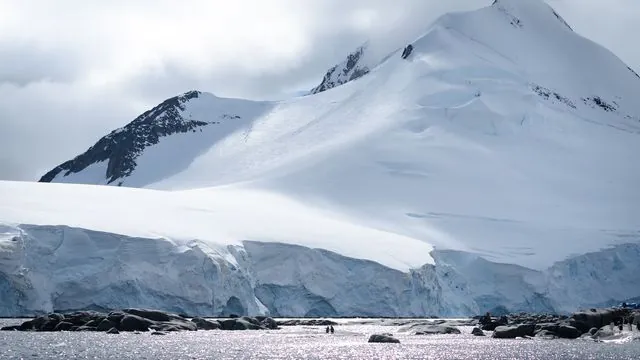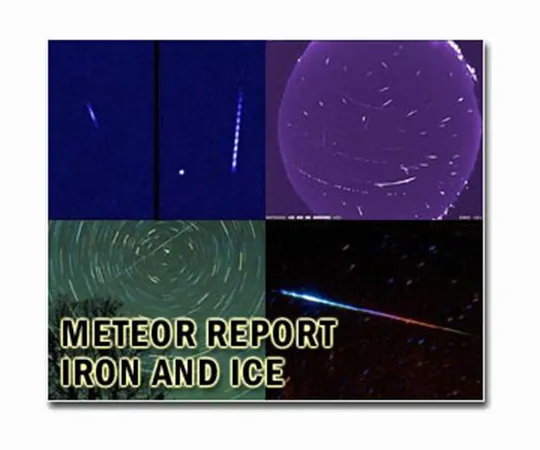
Groundbreaking Discovery: Antarctic Sea Probe Unveils Alarming Melting of Ice Shelves!
2024-11-11
Author: Michael
Groundbreaking Discovery: Antarctic Sea Probe Unveils Alarming Melting of Ice Shelves!
In an astonishing revelation, scientists have unearthed critical insights into the melting glaciers of Antarctica, specifically related to the Ross Ice Shelf, and the findings are sending shockwaves through the climate science community.
Research conducted by a team from the University of East Anglia (UEA) has uncovered how, over the past four decades, rising ocean temperatures have significantly contributed to the melting of this massive ice shelf. This transformation is not only alarming but raises serious concerns about accelerated global sea-level rise, far sooner than predicted.
The pivotal study hinged on an unexpected turn of events involving a specially designed autonomous Seaglider named Marlin. Deployed in December 2022, Marlin was intended to collect valuable oceanographic data in the Ross Sea. However, it experienced an unforeseen detour into the ice shelf cavity due to a strong southward-flowing current and remained there for four critical days, collecting data on water temperatures and currents beneath the overlying ice.
During its unplanned stay, the glider executed 79 dives, revealing a substantial intrusion of relatively warm water—up to 50 meters thick—seeping into the cavity from adjacent open waters. The temperatures recorded ranged between -1.9°C and -1.7°C, temperatures that are sufficient to melt the underside of the ice shelf, which stands in stark contrast to the freezing-point waters that typically exist in this region.
Dr. Peter Sheehan, the lead author of the study, explained, “While the average temperature increase over the studied period may seem minimal—just four thousandths of a degree annually—it can potentially accelerate ice loss by approximately 20 to 80 cm each year.” This cumulative ice melt alters the delicate balance of Antarctica’s ice dynamics.
What's particularly groundbreaking about this research is that it provides the first direct evidence of warm water intruding into the ice shelf cavity from the Ross Sea. “Normally, assessing such regions beneath ice shelves is impractical due to the risks involved in deploying instruments this close to the ice,” Dr. Sheehan added.
Ice shelves play a crucial role in stabilizing Antarctica's ice sheet, as they slow the flow of land ice into the sea. Their deterioration could significantly expedite global sea-level rise, a scenario that has alarmed scientists worldwide.
One contributing factor to this influx of warm water is the phenomenon known as Ekman currents—ocean surface flows driven by prevailing winds. As these winds change, they enhance the transport of heat into the ice shelf cavity, thereby accelerating the melting process. The implications of this developing trend are alarming, as ongoing climate change is expected to intensify these processes, posing a severe threat to global coastal communities.
Notably, Dr. Karen Heywood, co-author of the study, emphasized the necessity of integrating these newly observed dynamics into climate models, particularly given the continued unpredictability surrounding the Antarctic ice sheet's response to climatic shifts.
As these findings illuminate the increasing instability of the Antarctic ice shelves, the message is clear: urgent action is needed to address climate change, with the potential consequences extending globally. Will we heed the warning signs before it’s too late? The clock is ticking on our planet’s future.









 Brasil (PT)
Brasil (PT)
 Canada (EN)
Canada (EN)
 Chile (ES)
Chile (ES)
 España (ES)
España (ES)
 France (FR)
France (FR)
 Hong Kong (EN)
Hong Kong (EN)
 Italia (IT)
Italia (IT)
 日本 (JA)
日本 (JA)
 Magyarország (HU)
Magyarország (HU)
 Norge (NO)
Norge (NO)
 Polska (PL)
Polska (PL)
 Schweiz (DE)
Schweiz (DE)
 Singapore (EN)
Singapore (EN)
 Sverige (SV)
Sverige (SV)
 Suomi (FI)
Suomi (FI)
 Türkiye (TR)
Türkiye (TR)